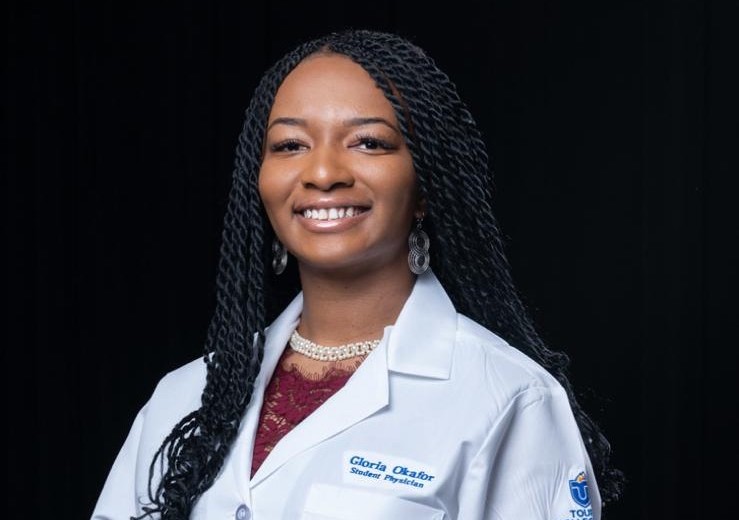Scholarship Honoring Black and Hispanic Med Students is Awarded to TouroCOM Middletown Student
Determined to Serve Those in Need, Gloria Okafor, MS, of California, Prepares to Provide Culturally Sensitive Care

Gloria Okafor, MS, OMS-II at TouroCOM Middletown, graduated from U.C.L.A. with a BS in Biology. She hails from the rural town of Taft, California, which at one time was a sundown town. Recently Okafor was awarded the “Rebecca Lee Crumpler, M.D. Scholarship” from the Association of Black Women Physicians (ABWP). The award, which goes to 10 Black or Hispanic/Latinx female medical students every year, is named after the first Black woman to earn a medical degree in the U.S., in 1864. Okafor is the only DO among this year’s awardees.
Why did you decide to pursue healthcare and to become a doctor?
My mother is a nurse. She’d come home and tell me about the day she had, the types of things she’d seen in the hospital. It seemed exciting and interesting, something to pursue. Especially giving care to others. Also, Taft is rural, geographically and medically isolated. It’s home to 12,000 people, including a large Hispanic population, many of whom are farmworkers. The hospital shut down almost 17 years ago, leading to residents having to commute long distances for care. This motivated me to pursue medicine. I wanted to help alleviate the physician shortage in underserved communities.
Why did you choose Touro?
I chose TouroCOM because the school’s mission aligned with my personal mission. The training I’m receiving is equipping me to become a great physician dedicated to serving different populations. I plan to provide culturally sensitive care to a complex nation, by showing awareness with openness and positivity and learning about other cultures to build trust and rapport with my future patients.
How has your medical education so far contributed to achieving your long-term goals?
After graduating with my master’s last spring, I matriculated into the DO program where I learned about the New York State AHEC Scholar program, a two-year fellowship that has put me on an interprofessional team of health professions students. We identify social determinants of health and propose solutions to reduce hospitalizations and visits to the ER. The program helps prepare us to provide primary care in rural and areas with poor medical care. Also, in Dec. I went on a medical mission to Accra, Ghana, where I used knowledge gained in school to do health care screenings and educate patients. On one clinic day I helped triage over 500 patients. It was life-changing for me, being able to make a small difference in the lives of so many.
Where do you see yourself practicing medicine after completing your education?
Probably in California serving a low-income population, practicing internal medicine. Also, as a second-generation Nigerian American, my culture has allowed me to appreciate my ethnicity and to learn about and cultivate relationships with people of different backgrounds.
What was one of the biggest challenges you were faced with on your path to medical school and do you have any advice for others aspiring to become doctors?
The MCAT entrance exam. It was a little bit of a struggle to hit the mark. I had multiple attempts but every time I wouldn’t get discouraged. I said, ‘It’s going to happen, just a matter of time.’ Don’t give up. Determination is key. Keep taking the test until you get the score you need. If you put your heart into doing a thing in life you’ll get there, it’s just a matter of time.

